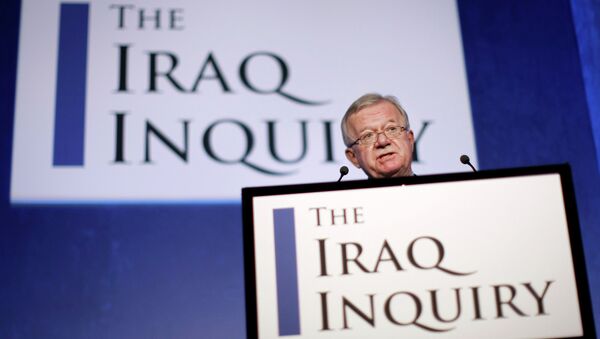The hold-up is being caused by a process in the UK known as Maxwellisation, named after a court ruling concerning the late Robert Maxwell, a former member of parliament and media mogul who was found dead in the sea having apparently fallen off his boat. It later emerged that he had stolen millions from his company pension schemes and the so-called Maxwell empire subsequently collapsed.
39,504 hours and counting! Where's the Chilcot report? http://t.co/KrWQ2xKOkH pic.twitter.com/jFvMi5i7as
— Jon Snow (@jonsnowC4) August 5, 2015
Maxwell was forever embroiled in litigation and his business affairs eventually led to him being found to be unfit to be a company director by a Department of Trade inquiry. It reported:
"We regret having to conclude that, notwithstanding Mr Maxwell's acknowledged abilities and energy, he is not in our opinion a person who can be relied on to exercise proper stewardship of a publicly quoted company."
However, Maxwell took the Department of Trade to court over its report into his business activities. He claimed that the report "contained conclusions highly critical of the plaintiff. He issued writs against the department and the inspectors, seeking declarations that the inspectors had conducted the inquiry and made their report without regard to the rules of natural justice, and asking for injunctions to restrain the inspectors from proceeding with the inquiry."
David Cameron has a moral obligation to get to the bottom of the reasons for the disastrous Iraq war — http://t.co/D30bj31FB7
— Alex Salmond (@AlexSalmond) August 5, 2015
In the Court of Appeal, Lord Denning said that, in the course of an inquiry, any person referred to in a report should be given a fair chance of responding to any criticism.
He said: "The inspectors have to make their report. They should state their findings on the evidence and their opinions on the matters referred to them. If their report is to be of value, they should make it with courage and frankness, keeping nothing back. The public interest demands it. It may on occasion be necessary for them to condemn or criticise a man. Before doing so, they must act fairly by him."
Critically, Denning added that "the inquiry will develop into a series of minor trials in which a witness will be accused of misconduct and seek to answer it. That would hold up the inquiry indefinitely. I do not think it is necessary. It is sufficient for the inspectors to put the points to the witnesses as and when they come in the first place."
Chilcot Delays
This goes to the heart of the Iraq inquiry, under Sir John Chilcot. Those named in the report – including former Prime Minister Tony Blair — who is believed to subject to criticism in the report, have spent the last four years undergoing the process of Maxwellisation, whereby they have been given opportunities to respond to any such criticism.
However, legal experts believe the procedure has been dragged on much longer than Lord Denning originally made and that the process is being sued to kick the report into the long grass.
Blair has come under increasing pressure over his decision to join US President George W. Bush in the invasion of Iraq in 2003, which led to the toppling of Saddam Hussein, who had been president since 1979. Blair was heavily criticized for releasing a 'dodgy dossier', ahead of the invasion, justifying the invasion and which turned out to be largely plagiarized from unattributed sources.
Movie idea: Chilcot has done nothing at all for six years. David Cameron finds out, and now he has 24 hours to find £9m. Action caper.
— Mark Wallace (@wallaceme) August 5, 2015
Another document released for the same effect said that Hussein had weapons of mass destruction which he could deploy to UK targets within 45 minutes – a claim later withdrawn by the head of MI6, according to a House of Commons statement by Blair’s then foreign secretary Jack Straw.
Good morning Mr Chilcott. If you are not going to publish will you be kind enough to return your massive fee.
— John DeVries (@Jonteinspain) August 5, 2015
In 2004, UN Secretary General Kofi Annan said of the Iraq invasion: "I have indicated it was not in conformity with the UN charter. From our point of view and from the charter point of view it was illegal."
In July Sir John wrote: "Those involved in Maxwellisation process have engaged fully and I continue to judge that no one has taken an unreasonable length of time to respond given the range and complexity of the issues under consideration."
But David Davis, the former shadow Home Secretary, told reporters "since the Iraq war, we have had Libya, Syria and Iraq again and we still don’t understand the mistakes we made in 2003."
Six years after he opened his inquiry, Sir John is still unable to tell parliament when his report will finally be published.



